イベント&アクティビティ
Joint DIJ & ICAS book talk The EU Migrant Generation in Asia
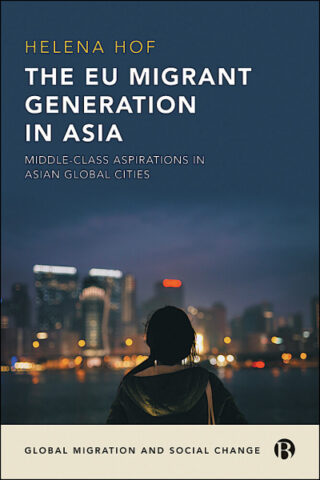
Jointly with the Institute of Contemporary Asian Studies (ICAS) at Temple University Japan, the DIJ sponsors the book talk The EU Migrant Generation in Asia – Middle-Class Aspirations in Asian Global Cities (Bristol UP, 2022) by Helena Hof. Hof’s book studies early-career migration by young Europeans and the changing outlook of Japan and Singapore. It shows how migration to Asian business centres has become a way of distinction and an alternative way of middle-class reproduction. Japan’s and Singapore’s changing migration regimes, however, pose different barriers to the migrants, which results in ambiguous feelings towards their host societies. Helena Hof is Senior Research and Teaching Fellow at the University of Zurich and a Research Fellow at the Socio-Cultural Department of the Max Planck Institute for the Study of Religious and Ethnic Diversity. The talk takes places on February 10 from 19:00-20:30 JST at Temple University Japan Campus. Registration is not required.
Celia Spoden presents research on ‘Telepresence Robots at School in Japan and Germany’
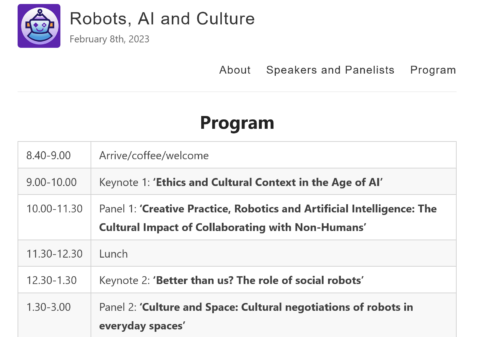
Together with Arisa Ema (University of Tokyo), DIJ social scientist Celia Spoden will give an online presentation on ‘Cyber-Physical Presence: Telepresence Robots at School in Japan and Germany’ in the panel ‘Culture and Space: Cultural negotiations of robots in everyday spaces’ at the Robots, AI and Culture symposium. The one-day symposium on February 8 is hosted by the University of Sydney and focuses on cultural translation, transference, and adoption of developing technologies in robotics and artificial intelligence. Celia’s co-authored paper on the use of telepresence robots in schools is based on a qualitative study that compares the Japanese case of the avatar-robot OriHime with the usage of AV1 in German schools. The avatar-robots aim to enable children who cannot attend school due to an illness, disabilities, or extended hospital stays to stay socially connected, restore normality, and prevent social isolation. Details and registration here
Barbara Holthus discusses Tokyo Olympics legacy at OAG lecture
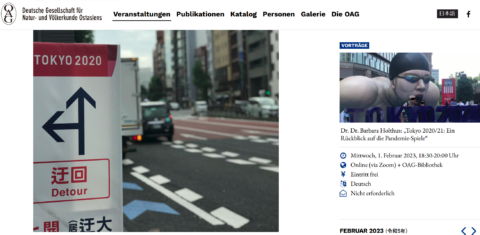
Since Tokyo won the bid to host the Olympic Games in 2013, the year 2020 was traded as both a “goal” and a “new beginning” in the country. To this end, the Olympic Games were instrumentalised in a variety of ways, including Tokyo as the capital of “Cool Japan”; the most technologically sophisticated Olympics; economic rebound; a new volunteer culture. In this talk on 1 February at the OAG Tokyo and online, DIJ deputy director and Olympic volunteer Barbara Holthus will contrast these efforts to reinvent the country and the instrumentalisation of the Olympics with what ultimately became of these lofty goals. What was Tokyo 2020/21 and what remains socially, economically, (infra)structurally? Barbara’s lecture also offers insights into the pandemic Games themselves through participant observation as “field cast” volunteers at the Paralympic Games. For more information on research related to the Olympics, see the DIJ’s special project on the Tokyo Olympics and the open access book publication Japan Through the Lens of the Tokyo Olympics.
Join the DIJ team as librarian (application deadline: 20 February)
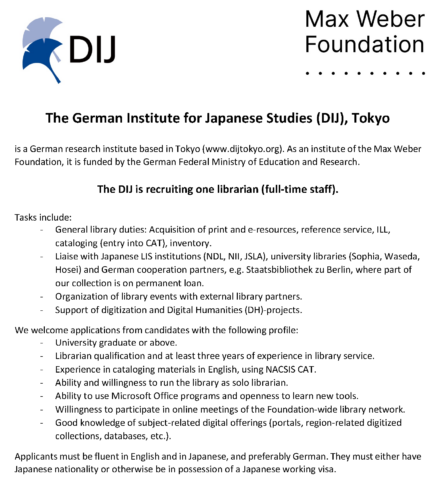 We are recruiting one librarian (full-time staff) for our DIJ library. Tasks include general library duties, liaison with Japanese and German cooperation partners, organization of library events, support of digitization and Digital Humanities projects. We welcome applications from qualified candidates with a university degree, librarian qualification, and at least three years of experience in library service. The successful candidate should be able and willing to run the library as a solo librarian. Applicants must be fluent in English and in Japanese, and preferably German. They must either have Japanese nationality or otherwise be in possession of a Japanese working visa. The employment would be first on a two-year basis starting April 2023 with the option of a permanent position thereafter, if certain conditions are met. Individuals interested in this position are invited to send their cover letter and CV in English via email no later than February 20, 2023. Please see the full job advertisement in English and in Japanese.
We are recruiting one librarian (full-time staff) for our DIJ library. Tasks include general library duties, liaison with Japanese and German cooperation partners, organization of library events, support of digitization and Digital Humanities projects. We welcome applications from qualified candidates with a university degree, librarian qualification, and at least three years of experience in library service. The successful candidate should be able and willing to run the library as a solo librarian. Applicants must be fluent in English and in Japanese, and preferably German. They must either have Japanese nationality or otherwise be in possession of a Japanese working visa. The employment would be first on a two-year basis starting April 2023 with the option of a permanent position thereafter, if certain conditions are met. Individuals interested in this position are invited to send their cover letter and CV in English via email no later than February 20, 2023. Please see the full job advertisement in English and in Japanese.
Unser Forschungsteam sucht Verstärkung
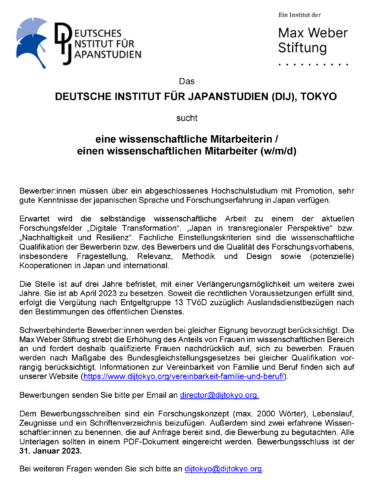 Das DIJ sucht eine wissenschaftliche Mitarbeiterin / einen wissenschaftlichen Mitarbeiter (w/m/d) mit einem abgeschlossenen Hochschulstudium mit Promotion, sehr guten Kenntnissen der japanischen Sprache und Forschungserfahrung in Japan. Erwartet wird die selbständige wissenschaftliche Arbeit zu einem der aktuellen Forschungsfelder „Digitale Transformation“, „Japan in transregionaler Perspektive“ bzw. „Nachhaltigkeit und Resilienz“. Fachliche Einstellungskriterien sind die wissenschaftliche Qualifikation der Bewerberin bzw. des Bewerbers und die Qualität des Forschungsvorhabens, insbesondere Fragestellung, Relevanz, Methodik und Design sowie (potenzielle) Kooperationen in Japan und international. Die Stelle ist auf drei Jahre befristet, mit einer Verlängerungsmöglichkeit um weitere zwei Jahre. Sie ist ab April 2023 zu besetzen. Bewerbungsfrist ist der 31. Januar 2023. Die Ausschreibung und Details finden Sie hier.
Das DIJ sucht eine wissenschaftliche Mitarbeiterin / einen wissenschaftlichen Mitarbeiter (w/m/d) mit einem abgeschlossenen Hochschulstudium mit Promotion, sehr guten Kenntnissen der japanischen Sprache und Forschungserfahrung in Japan. Erwartet wird die selbständige wissenschaftliche Arbeit zu einem der aktuellen Forschungsfelder „Digitale Transformation“, „Japan in transregionaler Perspektive“ bzw. „Nachhaltigkeit und Resilienz“. Fachliche Einstellungskriterien sind die wissenschaftliche Qualifikation der Bewerberin bzw. des Bewerbers und die Qualität des Forschungsvorhabens, insbesondere Fragestellung, Relevanz, Methodik und Design sowie (potenzielle) Kooperationen in Japan und international. Die Stelle ist auf drei Jahre befristet, mit einer Verlängerungsmöglichkeit um weitere zwei Jahre. Sie ist ab April 2023 zu besetzen. Bewerbungsfrist ist der 31. Januar 2023. Die Ausschreibung und Details finden Sie hier.
New edited volume studies German and Japanese approaches to ageing and elderly care in communities
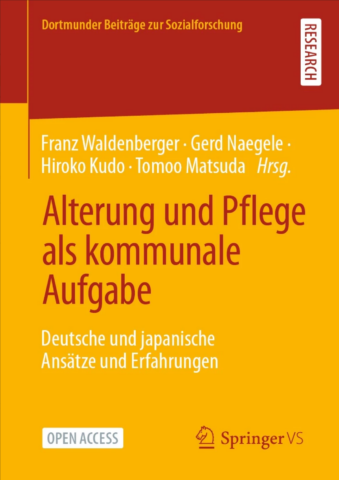
The contributions to the open-access anthology Alterung und Pflege als kommunale Aufgabe: Deutsche und japanische Ansätze und Erfahrungen (in German) describe and analyse the challenges and strategies of ageing and elderly care in Japanese and German communities from a multidisciplinary perspective. Themes include legal frameworks, civil society engagement, caregiver shortages, technology concepts for caregiving, and the impact of the Covid-19 pandemic on the situation of elderly citizens and those in need of care. The comparison of the approaches and experiences of both countries broadens the options for actions and can provide impulses for a reorientation of existing strategies. The book is co-edited by DIJ director Franz Waldenberger, Hiroko Kudo (Chuo University), Tomoo Matsuda (Mitsubishi Research Institute), and Gerhard Naegele (TU Dortmund). It is an outcome of the project Ageing and Elderly Care in German and Japanese Communities whose results were recently presented at an international conference in Tokyo (Details). A Japanese version of the book is currently being prepared.
New open access article studies effects of pandemic on singles’ relationships
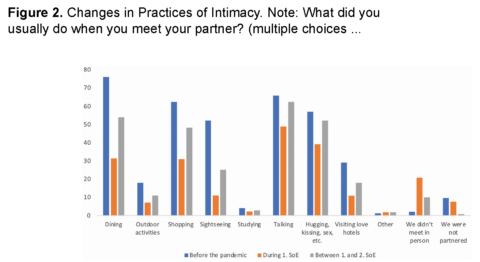
Singles (unmarried individuals) are a growing part of the Japanese population that has not received much attention in the context of the COVID pandemic. A new article by DIJ social scientist Nora Kottmann and Laura Dales (University of Western Australia) addresses the ways in which the pandemic and its associated interventions affect singles’ personal relationships and practices of intimacy as well as perceptions of singlehood and ‘solo activities’. Based on exploratory analyses of data from an online survey conducted in early 2021 , “Doing Intimacy in Pandemic Times: Findings of a Large-Scale Survey Among Singles in Japan” (Social Science Japan Journal, online first) shows that changes of practices of intimacy throughout the pandemic are less dramatic than anticipated. Nevertheless, changes are highly gendered and seem to support media and public discourse on how individuals are coping with the pandemic: an increase in social isolation, distress, acceptance of being single, and ‘solo activities’.
Hybrid DIJ Study Group session on Digital Hermeneutics
 Perspectives from the history and philosophy of science have helped conceptualizing knowledge production in the digital humanities (DH). In the laboratory setting, the concept of the trading zone has proved to be fruitful. Arguing that DH tools can be considered as experimental systems in the sense of Hans-Jörg Rheinberger, this lecture aims at proceeding beyond the laboratory setting and embrace the heterogeneity of DH scholarship as an interdisciplinary field of research. Based on the results of a two-day workshop at the German Institute for Japanese Studies, the lecture will try to integrate perspectives on epistemic virtues from the Global South, most notably those reflecting the decolonization of our current knowledge infrastructure and economy. Details and registration here
Perspectives from the history and philosophy of science have helped conceptualizing knowledge production in the digital humanities (DH). In the laboratory setting, the concept of the trading zone has proved to be fruitful. Arguing that DH tools can be considered as experimental systems in the sense of Hans-Jörg Rheinberger, this lecture aims at proceeding beyond the laboratory setting and embrace the heterogeneity of DH scholarship as an interdisciplinary field of research. Based on the results of a two-day workshop at the German Institute for Japanese Studies, the lecture will try to integrate perspectives on epistemic virtues from the Global South, most notably those reflecting the decolonization of our current knowledge infrastructure and economy. Details and registration here
Andreas Fickers, Luxembourg Centre for Contemporary and Digital History/DIJ Tokyo








 Open Access
Open Access
